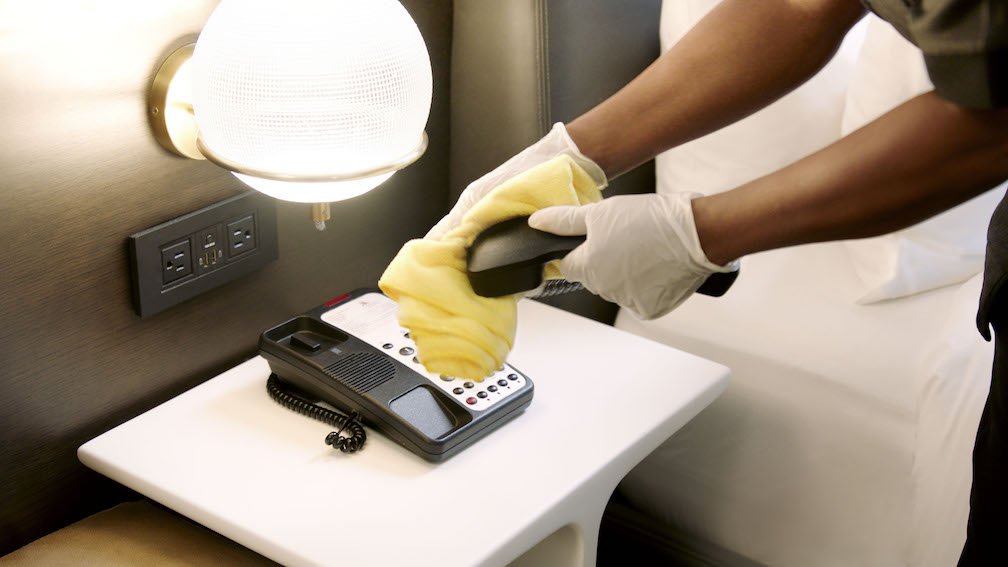Support Growing For Hotel Industry’s Safe Stay Initiative
October 28, 2020
Photo Credit: Marriott-International
Support for the American Hotel & Lodging Association’s (AHLA) Safe Stay initiative continues to grow with endorsements coming from leading scientists, physicians and public health experts in epidemiology and infectious disease.
The new endorsements come from the Infectious Diseases Society of America, the Association for Linen Management, which represents the personnel involved in the textile care industry, as well as a certified industrial hygienist and former infectious diseases epidemiologist with the U.S. Centers for Disease Control (CDC) and Prevention and World Health Organization (WHO), Dr. Murray Cohen. Safe Stay is an industry-wide initiative focused on enhanced hotel cleaning practices, social interactions, and workplace protocols to meet the new health and safety challenges and expectations presented by COVID-19.
The latest version of the Safe Stay protocols includes newly-released CDC guidance on hotel operations, including meetings and events. Safe Stay includes enhanced guidance on elevator operations, food service operations and workplace health safety plans. The Safe Stay guidelines also feature the latest CDC recommendations on daily room cleanings to limit in-person contact. The CDC recommends, “guestrooms occupied by the same customer over multiple days should not be cleaned daily, unless requested.”
“The top priority for the hotel industry has always been the health and safety of guests and employees. Through Safe Stay, the hotel industry continues to be recognized by public health officials and industry partners for our leadership on implementing rigorous health and safety standards,” said Chip Rogers, president and CEO of the American Hotel & Lodging Association. “As we continuously update our safety protocols to ensure the safest environment, new guidance from the CDC on hotel operations, including daily room cleanings, will meet travelers’ expectations while also helping to further limit contact between employees and guests.”
“The Infectious Diseases Society of America has endorsed the hotel industry’s Safe Stay program because it sets comprehensive health and safety requirements necessary to meet the current public health crisis. With these rigorous standards, the hotel industry plays an important role in helping to reduce the risk of transmission of COVID-19,” said Barbara Alexander, MD, MHS, FIDSA, president of IDSA.
The new guidance around room cleaning is also in alignment with traveler priorities, as nearly nine out of 10 (88%) frequent travelers say that limiting in-room housekeeping to “by request only” would increase their comfort level. This is according to a recent national survey commissioned by AHLA conducted by Morning Consult. Additionally, nearly three-in-five (58%) guests do not want daily housekeeping; and 58% would not be comfortable with housekeeping staff entering their room without advance permission.
“As the only professional trade organization providing training and guidance to both in-house and contracted hospitality laundry service providers, ALM endorses AHLA’s Safe Stay initiative because it is a comprehensive program rooted in CDC guidelines which will keep hotels clean and employees safe during the COVID-19 pandemic. We’ve been proud to work alongside AHLA in their dedication to keeping those who support the hotel industry–who we both represent– safe and healthy during this challenging time,” said Linda Fairbanks, executive director of the Association for Linen Management.
Dr. Murray Cohen, a certified industrial hygienist and former infectious diseases epidemiologist with the U.S. Centers for Disease Control (CDC), and Prevention and World Health Organization (WHO), said the updated AHLA Safe Stay guidelines are comprehensive and reflect the advice of leading health agencies. “Based on my 45 years in public health practice, especially prevention of workplace infection transmission, I have reviewed the hotel industry’s guidelines and they are directly aligned with the public health guidance provided by the CDC for the hotel industry in ensuring the safety of both their workforce and guests,” stated Dr. Cohen. “The Safe Stay program adheres to rigorous hygiene protocols, social distancing and contactless options to further limit unnecessary interaction between employees and guests.”












